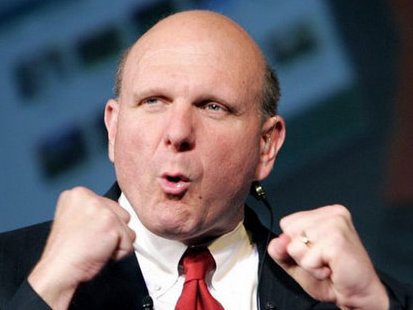Microsoft CEO Ballmer Still Dancing Around Surface Pricing
We probably won't know any true Surface pricing until just days before it actually ships.
In a recent interview with the Seattle Times, Microsoft CEO Steve Ballmer danced around the pricing of the company's upcoming Surface tablet, saying that Microsoft will offer a very competitive product from a features standpoint. He also took a shot at the cheaper, smaller tablets like Google's Nexus 7 and Amazon's Kindle Fire HD, indicating that they're "less good, they're chintzier."
"If you say to somebody, would you use one of the 7-inch tablets, would somebody ever use a Kindle (Kindle Fire, $199) to do their homework? The answer is no; you never would. It's just not a good enough product. It doesn't mean you might not read a book on it," he said.
But that's the thing: the Kindle Fire and similar tablets aren't really made for doing homework. They're good for entertainment and web surfing, for checking email and reading books and doing some lite online shopping. Comparing the 10-inch Surface tablets to these products is like comparing a BMW to a bicycle, yet that doesn't stop Ballmer from poking fun at the 7-inch competitors anyway.
"If you look at the bulk of the PC market, it would run between, say, probably $300 to about $700 or $800. That's the sweet spot," he added.
Still, students can do their homework on 7-inch Android tablets like the Nexus 7. Hook up a Bluetooth keyboard and mouse, and you have a makeshift netbook. Sure, the screen is rather small, but there are plenty of free tools that students could use to get the job done without having to dump loads of money into Office 2013. Users can write and store documents in the cloud using Google Drive, or use one of the premium productivity suites like QuickOffice or Documents to Go. It can be done, and on the cheap too.
Earlier in the interview, Ballmer called 2012 the most epic year in Microsoft's history. Indeed it may be, as Windows 8 launches a whole new generation for the popular operating system. Microsoft is embracing an era where touch-based mobility has become one of the primary computing platforms, and desktops are becoming less of a focal point. That said, this will be even bigger than Windows 95's debut.
"You know, Windows 95 was certainly the biggest thing in the last 20 years until now," he said. "I think Windows 8 certainly surpasses it. It's a little hard to compare things like the founding (of the company) and the introduction of the first popular PC and the system that popularized it, but it's at that scale."
Get Tom's Hardware's best news and in-depth reviews, straight to your inbox.
Ballmer was then asked about what he's going to do if Windows 8 doesn't catch on. He responded by saying the platform will do great, dismissing any doubts. "I'm not paid to have doubts," he mused.
"People talk about: 'How healthy is the PC market?' There's going to be close to 400 million PCs sold in the next year, which makes it a big market. And whether it's 405 (million) or 395 (million), it's a big market, and Windows 8 will propel that volume," Ballmer added.
To read the full interview, head here.

Kevin Parrish has over a decade of experience as a writer, editor, and product tester. His work focused on computer hardware, networking equipment, smartphones, tablets, gaming consoles, and other internet-connected devices. His work has appeared in Tom's Hardware, Tom's Guide, Maximum PC, Digital Trends, Android Authority, How-To Geek, Lifewire, and others.
-
bourgeoisdude Ballmer's a piece of work. But if Surface RT debuts at $299 as he implies, it'll definitely be an attractive alternative to Google/iOS. I'll admit I'm more interested in the Pro version though.Reply -
igot1forya Thanks Toms, your headline gave me the disturbing image of Steve Ballmer dancing around... now I must take a cold shower.Reply -
CaedenV October cannot get here fast enough. If I knew what the full feature set of WP8/RT were, and what the prices of the devices were, then I would be able to make a decision right now about if I will be moving to that ecosystem, or moving from windows to the linux/android ecosystem. I don't mind waiting for all the final win8/RT/WP8 hardware to be released if that is what I am going to move to, but if I am waiting for nothing I would much rather know now, and make my purchase.Reply
At least I know what to expect with win8 for the desktop, and for a $40 upgrade fee to move from win7home to win8pro I am sold on that at least, but there are simply too many unanswered questions about the mobile platforms. -
master_chen igot1foryaThe disturbing image of Steve Ballmer dancing around...Developers. Developers? Developers?! Developers!Reply
-
back_by_demand igot1foryaThanks Toms, your headline gave me the disturbing image of Steve Ballmer dancing around... now I must take a cold shower.Cold shower cos he gave you a boner? THAT'S disturbing...Reply -
RealBeast "You know, Windows 95 was certainly the biggest thing in the last 20 years until now," he said.Reply
Now that's funny, or very sad if he didn't mean it as a joke.
"I think Windows 8 certainly surpasses it. . . . "
I would hope so, but does it surpass Windows 7 Mr. Ballmer? -
Bloob The whole Win 8 -thing will be quite popular in the long run, I believe. Basically, you'll be able to make applications for a phone, tablet, laptop, desktop, or tv(xbox), or any combination of these, in "one sitting". Of course, and you'd have to figure out the controls for each individual platform, but that's no biggie. The best applications could require only a single purchase between devices. Of course system optimized applications ( mainly games ), will likely still stay on one or two of these platforms.Reply
